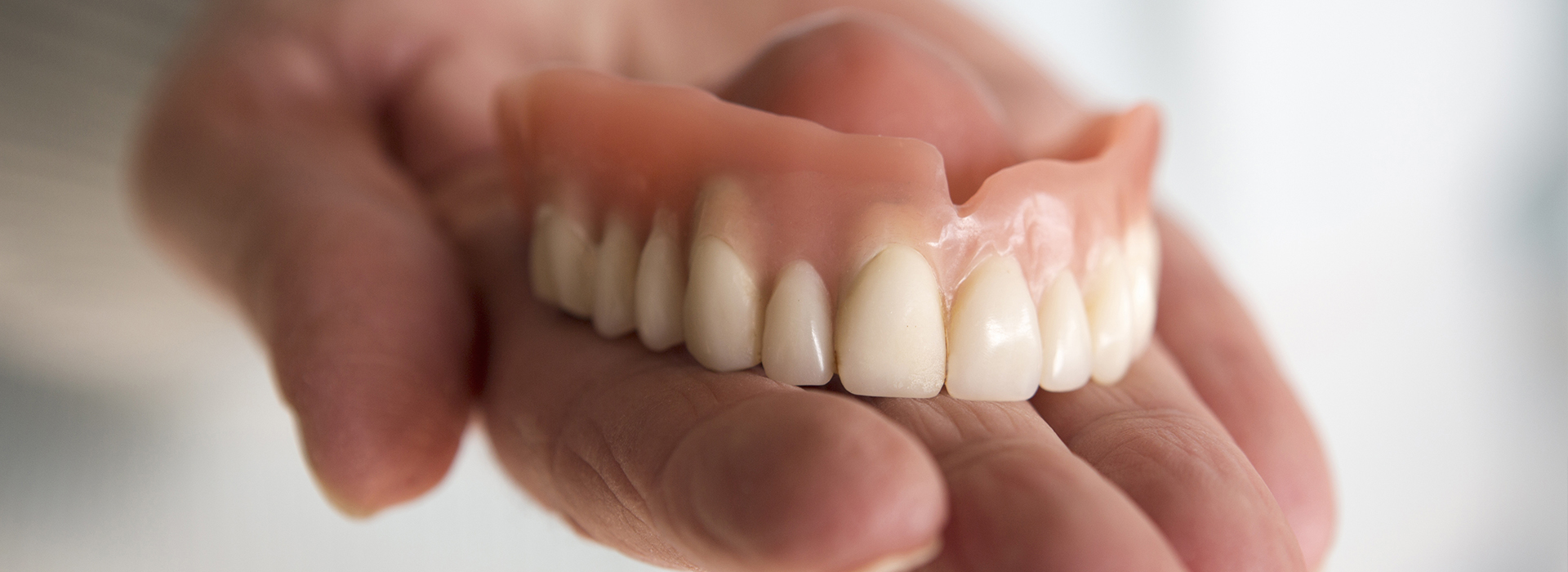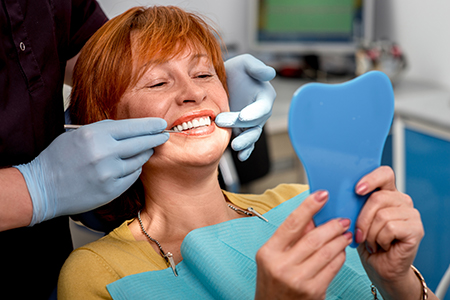Call Today
(908) 852-3693

Advances in dental materials and laboratory techniques have changed what dentures can do. Today’s removable prostheses are lighter, more lifelike, and designed with a stronger focus on comfort and function than ever before. For many patients, a thoughtfully made denture restores not only the appearance of a complete smile but the ability to eat, speak, and engage with confidence.
At our office, we combine experienced clinical judgment with contemporary fabrication methods to deliver dentures that respect each patient’s anatomy and lifestyle. When appropriate, we evaluate fixed options such as implants and bridges alongside removable solutions, and we help patients choose the path that best fits their oral health goals.
Dr. Anthony Iuvone, DMD and the clinical team prioritize individualized care: every denture begins with a careful assessment of the mouth’s soft tissues, the position of remaining teeth, and how facial contours will be supported. That attention to detail contributes to prostheses that look natural and integrate comfortably with daily life.
Missing teeth affect far more than appearance. Gaps in the dental arch can alter chewing patterns, create challenges for clear speech, and lead to gradual shifting of the remaining teeth. Over time, changes in bite and tooth position can increase wear on certain teeth and create new dental problems if left unaddressed.
The loss of teeth also affects the soft tissues and bone beneath the gums. Without the stimulation provided by tooth roots, the jawbone tends to remodel and shrink, which can change facial proportions and give a sunken or collapsed look. A well-designed denture helps support facial contours, slowing the visual effects of bone loss and restoring a fuller profile.
Emotional and social effects are important, too. People often report increased self-consciousness around smiling and speaking when teeth are missing. Replacing lost teeth with an appropriate prosthesis can reduce that anxiety, improve nutrition by making a wider range of foods accessible, and contribute to overall wellness.

A denture is a removable appliance that replaces missing teeth and the tissues around them. It consists of prosthetic teeth set into a base that rests on the gum-covered jawbones. Dentures are versatile: they can replace a few teeth where others remain, or restore an entire arch when a complete set of teeth is missing.
Choosing the right denture begins with a full oral evaluation. We assess remaining teeth for strength and prognosis, evaluate the shape and health of the gums and jawbone, and consider facial aesthetics and speech. These factors determine whether a partial denture, a full denture, or a hybrid solution involving implants is the best option.
Removable prosthetics have distinct advantages — they are easy to clean, allow the tissues to be inspected and cared for, and can often be adjusted or relined as the mouth changes. When extra stability is needed, dentures can be designed to work with attachments or implants to provide enhanced retention and function.
Complete dentures replace all teeth in the upper or lower jaw. Their design responds to the individual’s facial contours and the shape of the mouth to create a stable, comfortable fit. For many patients, a well-made complete denture restores chewing ability and improves facial support.
Conventional complete dentures are fabricated after the gums have healed from extractions, which can offer a more precise long-term fit. Immediate dentures, by contrast, are placed on the same day teeth are removed so a patient never goes without teeth during healing. Immediate prostheses are often adjusted or relined as tissues remodel to maintain comfort and fit.
Overdentures
Overdentures gain added stability by resting on natural tooth roots that have been appropriately prepared or on dental implants. These attachments help preserve jawbone and improve retention compared with conventional suction-fit dentures.
Implant-supported options
Where appropriate, a denture can be designed to secure to dental implants. Implant-supported dentures dramatically increase stability and are especially helpful for patients who have struggled with conventional denture movement.
When some healthy teeth remain, removable partial dentures fill gaps and restore the continuity of the dental arch. They typically rely on clasps or precision attachments to the adjacent teeth, which helps maintain alignment and prevents unwanted drifting of natural teeth.
Partial frameworks are now available in a variety of materials — including lightweight, flexible resins and refined metal designs — so we can match strength, comfort, and esthetics to each patient’s needs. Thoughtful design keeps the appliance stable during function while minimizing bulk and irritation.
In every case our objective is the same: a prosthesis that restores oral function, supports healthy tissue, and blends unobtrusively with the patient’s smile and facial features.

Successful denture treatment starts with careful planning. We review medical and dental history, take precise impressions, and use diagnostic imaging as needed to evaluate bone and tissue conditions. These steps guide the selection of teeth shape, shade, and the contours of the denture base to achieve a balanced and natural appearance.
Fabrication typically involves several visits: measurements, try-ins, and adjustments allow us to fine-tune fit, bite, and esthetics before delivering the final prosthesis. The laboratory process combines skilled craftsmanship with modern materials to produce durable, lifelike teeth and stable bases.
Occasionally, preliminary procedures such as extractions or minor tissue shaping are recommended to ensure optimal prosthetic fit. When implants are part of the plan, treatment sequencing and healing time are coordinated so the final prosthesis is comfortable and long-lasting.
Adjusting to a new denture is a process. Early on, some patients notice changes in speech or a temporary increase in saliva production — both of which tend to normalize within days to weeks. Practicing speaking aloud and starting with soft foods can accelerate the adjustment period and help the mouth adapt more comfortably.
Proper daily care preserves both the denture and oral tissues. Rinse and brush the denture after meals, use a denture brush and nonabrasive cleaner, and soak removable prostheses overnight as directed. Equally important is maintaining the health of any remaining natural teeth, gums, and the oral mucosa with regular hygiene routines.
Follow-up care lets us monitor fit and function over time. As the jawbone and soft tissues change, relines or adjustments may be needed to maintain comfort and retention. In some cases, adding attachments or converting to an implant-supported design can resolve ongoing stability concerns and improve chewing efficiency.
Routine dental visits also include an oral examination to check tissue health, screen for changes, and ensure that the denture continues to meet the patient’s functional and esthetic goals.

Our practice is committed to approachable, evidence-informed denture care that respects each patient’s preferences and clinical needs. If you’re exploring tooth replacement options, our team will review possibilities and help you understand the advantages and trade-offs so you can make an informed choice.
Please contact us for more information about denture options and what to expect during treatment.
Today, it’s easier than ever to replace missing teeth and achieve natural-looking, durable, and long-lasting results! Depending on a patient’s dental needs, lifestyle, expectations of care, and budget, choices can include conventional fixed bridgework, dental implants, or removable partial and complete dentures. At the office of Dr. Anthony Iuvone, DMD, we’ll discuss all your options in care and answer all your questions as you choose the solution that’s right for you.
With advances in dental materials and technology, today’s dentures are more comfortable and realistic-looking than ever before.
Whether you wear partial or complete dentures, it’s essential to see the dentist for routine care. Besides checking the fit and condition of your dentures and making any necessary adjustments, you’ll also receive a comprehensive exam to check on the health of any remaining teeth as well as the soft and hard tissues in and around the oral cavity.
A same-day denture offers an accelerated design and fabrication process that allows a patient to go from impression taking to denture insertion in a single day.
For patients who don’t want to wait after having teeth extracted, an immediate denture can be inserted the same day your teeth are removed. Sometime later you may need the denture relined to address any changes in its fit once the extraction sites have completely healed.
While no one wants to drop or break a partial or complete denture, accidents do happen. The good news is that in some cases, your partial or complete denture is reparable. It all depends on the extent of the damage. Don’t hesitate to contact our office if you’ve broken or damaged your denture. We’re happy to help.
The simple act of taking your partial denture in and out can cause certain types of metal clasps to loosen over time. When you come in for your checkup visit or contact our office for an adjustment, we’ll assess the fit of your partial and tighten the clasps for improved stability and comfort.
While rebuilding a complete smile is a worthwhile investment, our office is sensitive to the costs involved in dental care. We customize care and will discuss which treatment options address your needs, lifestyle, and budget. How much a new denture will cost depends on the type of the prosthesis, its design, and the materials used to fabricate the supportive base, teeth, and clasps or precision attachments. Dentures that include the placement of dental implants for added retention and stability typically involve additional costs.
If you have dental insurance, your coverage may include a new or replacement set of dentures. Our staff is happy to review your coverage with you to ensure you are maximizing your insurance benefits while minimizing any out of pocket expenses.
At the office of Dr. Anthony Iuvone, DMD, we provide an extensive range of dental services, including the latest and most effective methods to help patients with missing teeth rebuild complete and beautiful smiles. As skilled and experienced professionals, we recognize that every patient is different, and every smile is unique. We’re passionate about what we do and take great pride in providing personalized treatment plans while treating our patients as valued partners in care.
Dentures are removable prosthetic appliances that replace missing teeth and the tissues around them, restoring the appearance and basic functions of a natural dentition. They consist of artificial teeth set into a gum-colored base that rests on the oral soft tissues and, when appropriate, over underlying bone or implants. By re-establishing tooth contacts and facial support, dentures help patients chew, speak clearly, and smile with greater confidence.
Retention and stability depend on the type of denture and the anatomy of the mouth; some dentures rely on suction and precise fit while others use attachments or implants for added hold. Properly designed dentures distribute biting forces across the gums and underlying bone to reduce localized pressure and improve comfort. Regular care and periodic adjustments help maintain fit and function as tissues change over time.
There are several denture designs to address different clinical situations, including complete (full) dentures that replace all teeth in an arch and removable partial dentures that fill gaps when some natural teeth remain. Materials and frameworks vary from traditional acrylic bases to lightweight flexible resins and precision metal frameworks, allowing us to balance strength, comfort, and esthetics for each patient. Immediate dentures are provided at the time of extractions so a patient does not go without teeth, while conventional dentures are made after tissues have healed for a more precise long-term fit.
For patients seeking greater stability, overdentures and implant-supported dentures are options that use prepared tooth roots or dental implants as anchors. These designs improve retention, chewing efficiency, and patient confidence compared with suction-fit dentures alone. The choice of material and design is guided by oral health, jawbone condition, esthetic goals, and lifestyle needs.
Deciding on the appropriate denture begins with a comprehensive oral evaluation that includes assessment of remaining teeth, gum health, jawbone volume, bite relationships, and facial support needs. If healthy natural teeth remain with good prognosis, a removable partial denture can preserve tooth alignment and restore function while protecting those teeth. When all teeth in an arch are missing or unsalvageable, a complete denture becomes the indicated solution to restore the arch.
If enhanced stability and long-term bone preservation are priorities, we evaluate implant-supported options and the patient’s suitability for implant therapy, which depends on general health, bone quantity, and treatment goals. Patient lifestyle, manual dexterity, and preference for removability versus fixed solutions are also part of the decision. Treatment planning often includes diagnostic imaging and study models to compare outcomes for each approach.
Conventional dentures are fabricated after the gums have fully healed following extractions, which typically yields a more accurate long-term fit because the tissues have settled. The laboratory process for conventional dentures allows for final impressions and multiple try-ins to fine-tune bite, tooth position, and esthetics before delivery. This pathway often requires a healing period during which patients may be without a full prosthesis unless an interim solution is provided.
Immediate dentures are made in advance and inserted on the same day as tooth removal so the patient does not have a period without teeth during healing. While immediate dentures offer the advantage of continuous esthetics, they usually require adjustments or relines as the gums and bone remodel during recovery. Both approaches have valid indications, and the choice depends on clinical conditions, patient priorities, and treatment sequencing.
Daily denture care preserves the prosthesis and the health of the oral tissues. Rinse dentures after meals to remove loose food debris, then gently brush them with a soft denture brush and a nonabrasive cleanser to avoid scratching the surfaces. Soak removable prostheses overnight in an appropriate solution as recommended so they remain hydrated and bacteria are controlled.
Equally important is caring for any remaining natural teeth, gums, and oral mucosa; patients should continue regular brushing, flossing, and professional hygiene visits. Avoid using hot water, abrasive toothpaste, or harsh household cleaners that can damage denture materials. If a denture breaks or develops persistent sore spots, contact your dental team for evaluation rather than attempting home repairs.
Adjustment to new dentures varies by individual but most patients experience the majority of changes within days to a few weeks. Early adaptation commonly includes increased saliva production, transient changes in speech, and mild sore spots as the mouth learns new biting patterns. Practicing speaking aloud, beginning with softer foods, and gradually introducing firmer items can speed adaptation and build comfort.
Follow-up visits are important during this period to identify pressure areas and make necessary adjustments or relines. Some patients require several minor modifications to optimize bite and fit, and ongoing observations help prevent long-term irritation. If difficulties persist beyond a reasonable adaptation period, the dental team will evaluate alternative retention options or further refinements.
Dentures restore facial support by replacing tooth structure and reestablishing the contours of the lips and cheeks, which can reduce the sunken appearance that sometimes follows tooth loss. While conventional dentures support soft tissues, they do not prevent the underlying jawbone from remodeling after tooth extraction because they do not replicate the stimulation provided by tooth roots. Over time, changes in bone shape can affect denture fit and facial proportions.
Options that help preserve bone include retaining prepared tooth roots under an overdenture or placing dental implants to transmit functional forces into the jaw, which supports bone maintenance. These solutions often provide improved long-term stability and may limit the extent of tissue changes compared with removable dentures alone. A careful evaluation of bone health and prosthetic goals will guide whether such approaches are appropriate for a patient.
Overdentures are removable prostheses that gain additional support from retained tooth roots or attachments connected to implants, offering improved retention and a more secure feel than conventional suction-fit dentures. Implant-supported dentures may be removable or fixed and are anchored directly to dental implants placed in the jaw, resulting in significantly increased chewing efficiency and reduced movement. These options are especially helpful for patients who have experienced difficulty with denture stability or pronounced bone loss affecting retention.
Candidates for overdentures or implant-supported designs undergo an evaluation of overall health, oral anatomy, and bone volume to determine suitability. When implants are feasible, treatment planning includes imaging and staged healing so the final prosthesis integrates with the implants for long-term function. These solutions can enhance comfort, nutrition, and confidence for many patients when clinical conditions allow.
Denture planning begins with a thorough review of medical and dental history, diagnostic impressions, and imaging as needed to assess bone and tissue conditions. The team selects tooth shape, size, and shade to harmonize with facial features and overall esthetics, and multiple try-ins allow verification of bite, speech, and appearance before the final prosthesis is completed. Precision measurements and careful laboratory work combine to produce durable, lifelike teeth and a well contoured base.
At the office of Dr. Anthony Iuvone, DMD, we emphasize individualized treatment and close communication with laboratory technicians to achieve predictable results. Fabrication often involves staged visits for measurements, wax try-ins, and adjustments so the final denture fits comfortably and functions effectively. When preliminary procedures such as extractions or minor tissue shaping are needed, these are coordinated to optimize the prosthetic outcome.
Routine follow-up is essential to monitor tissue health, check fit, and make adjustments or relines as the jawbone and soft tissues change with time. Patients should schedule regular dental examinations so the clinician can screen for mucosal changes, evaluate the condition of any remaining teeth, and recommend maintenance steps to preserve oral health. Relines, repairs, or attachment maintenance may be necessary to restore comfort and function as prostheses and tissues evolve.
For denture wearers who later choose to enhance stability with implants, the practice will coordinate treatment sequencing and long-term care to integrate the new support system. Patients of Dr. Anthony Iuvone, DMD are encouraged to maintain routine hygiene habits and attend periodic checkups so their dentures remain safe, functional, and esthetically pleasing throughout their service life.
